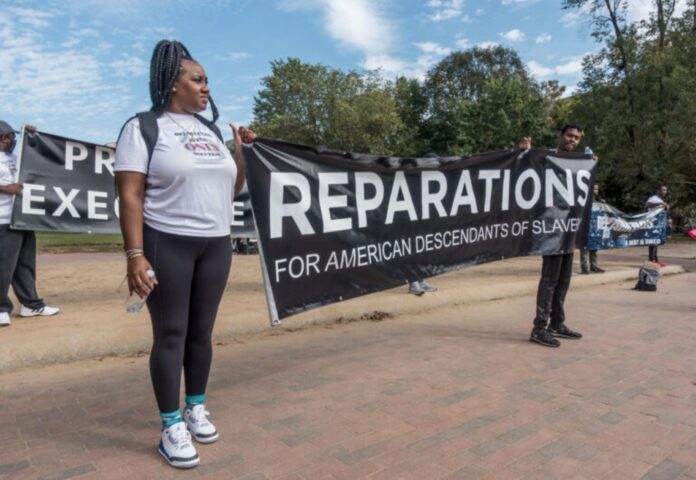
By Macy Meinhardt, Voice & Viewpoint Staff Writer
In the lengthy journey to acknowledge and rectify ongoing injustices rooted in California’s history with slavery, the San Diego City Council voted 8-0 to support the California Legislative Black Caucus’s (CLBC) Reparation bill package.
“We must continue to address the disparities and repair the harm caused by the cruel and inequitable treatment that stemmed from Slavery,” said District 4 Councilmember Henry Foster, who brought the item forward to council.
San Diego County has close ties to the reparations movement in California. Home to over 200,000 Black Californians, native leaders such as Secretary of State Dr. Shirley Weber, District 4 Supervisor Monica Montgomery-Steppe, and Assembly Member Dr. Akilah Weber (D-79) have played crucial roles in the multi-year development of a reparations bill package. This specific package consists of 14 “priority” bills designed to address systemic issues in education, civil rights, criminal justice reform, health, and business for Californians who are descendants of chattel slavery.
“When you have done harm, it is your responsibility to apologize, and to then create rules and regulations and laws so that it never happens again,” said Secretary Weber.
The bills are backed by lengthy research and compiled evidence on how the impact of 350 years of enslavement continues to carry into the political, legal, health, financial, educational, and environmental framework of Black American lives.
“The African American story in the United States is marked by repeated failed promises to right the wrongs of the past—both distant and recent—and failure to acknowledge and take responsibility for the structural racism that perpetuated these harms,” the Executive Summary of the California Reparations Report states.
The nation has never formally invested in the topic of reparations nor apologized for its role in perpetuating its lasting impact, officials at the meeting expressed.
“After many efforts I decided California should take the lead as we usually do,” said Dr. Weber, who authored the first bill AB3121 to initiate the task force on reparations in 2020.
Although the set of bills is still in the early stages, the resolution signed by the city demonstrates San Diego’s support for advancing the bills through the state legislature.
UC Berkeley survey studies show that while the majority of California voters are against cash payments, most agree that Black Californians continue to be affected by the legacy of slavery today.
“I want to be clear that reparations are not only about financial compensation, they represent a tangible acknowledgement of the profound wrongs inflicted on descendants, and a commitment to healing and justice,” said Supervisor Montgomery-Steppe.
“Supporting this year’s reparations package is pivotal to the moral and ethical foundations of our city,” said Supervisor Montgomery Steppe.
Here are the bills at a glance:
EDUCATION:
AB 1929: Aims to boost career technical education by setting up a grant program to get more descendants enrolled in STEM-related programs in high schools and colleges
AB 3131: Career education financial aid for redlined communities
CIVIL RIGHTS:
AB 3080: Issue a formal apology for human rights violations and crimes against humanity on african slaves and their descendants
AB 1815: Introduced by Asm. Weber, prohibits discrimination based on natural and protective hairstyles in competitive sports.
SB 1050: Restore property taken during race-based uses of eminent domain
California Constitutional Amendment 7: Proposes changes to the California Constitution—enable state funding for programs that boost life expectancy, improve educational outcomes, and reduce poverty for specific groups based on race, color, ethnicity, national origin, or marginalized genders, sexes, or sexual orientations.
CRIMINAL JUSTICE REFORM:
California Constitutional Amendment 8: Amends California Constitution to prohibit involuntary servitude for incarcerated persons.
AB 1986: Seeks to end practice of book banning without oversight in california jails
AB 2064: funds community-driven solutions to reduce violence in African American communities, at the family, school, and neighborhood levels.
AB 280: Restricts use of solitary confinement within CDCR
HEALTH:
AB 1975: Makes medically supportive food and nutrition interventions a permanent part of Medi-Cal benefits.
SB 1089: Addresses food insecurity by making it a requirement to inform community stakeholders before the closure of a major grocery store
BUSINESS:
AB 2862: removes barriers to licensure for individuals with criminal records, prioritizes African American applicants, particularly descendants, seeking occupational licenses.
To learn more about each of these bills visit: https://blackcaucus.legislature.ca.gov/2024-reparations-legislative-package



